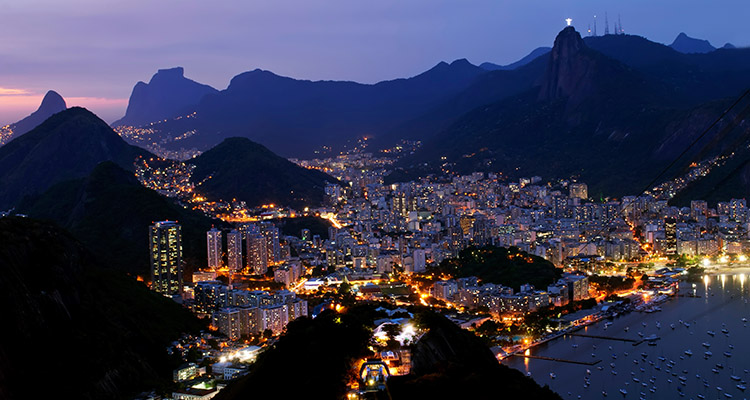In a press conference on Oct. 2, 2009, International Olympic Committee President Jacques Rogge proclaimed, “I have the honor to announce that the games of the 31st Olympiad [in 2016] are awarded to the city of … Rio de Janeiro.” Cheers erupted, and in Brazil, people celebrated a rare achievement: Brazil is the only South American country, the second country in Latin America and the second country in the Southern Hemisphere to host the Olympic Games.
Just two years earlier, Brazil was named the host country for the 2014 FIFA World Cup. While this was not as rare an achievement as winning an Olympic bid, hosting two major international sporting events two years apart provides Brazil with both an excellent opportunity and an enormous challenge.
John Wendt, J.D., St. Thomas professor of ethics and business law, serves on the Special AAA Panel for U.S. Olympic Committee Disputes. He also worked on the committee that pulled together Minneapolis’ 1996 bid for the Olympics. One of his areas of specialization is Olympic policy and business. “The pressure to put on [the Olympics] is insane,” he said. “You have to be prepared for an influx of different languages and cultures. You have to worry about logistics. You have to upgrade highways and facilities.” And after the games, the question arises: What will happen with all the facilities built for the occasion? Hosting the games is a headache, but there can be a payoff. Following the summer 2012 Olympics, “East London was dramatically regenerated and transformed,” Wendt said.
Leonardo Melim ’11 is a treasury analyst with OGX Oil and Gas in Brazil. The native Brazilian noted that these events have mixed impact on business. “Although these worldwide events, from the Pope’s visit to the Olympic Games, are a great billboard to the world to promote Brazil and its people, they are very disruptive economically,” he said. The events slow down production, and many businesses shut down for a while; however, Brazil’s tourist industry is booming. “We are hosting people from all over the world,” he said. “My hope is that the country can capitalize on that in the future.”
The Wall Street Journal confirmed Melim’s perceptions with its July 18 report on the economic impact of the World Cup on Brazil. Tourism exceeded expectations; an estimated 1 million tourists came to Brazil for the World Cup. Other areas of the economy suffered. Crude steel production fell 4.9 percent from the previous year, automobile production fell 33 percent and hiring slowed significantly. The picture painted by these initial reports is bleak.
Can Rio Pull This Off?
With two international sporting events so close to each other, many people have concluded that Brazil has overextended itself. Hosting the World Cup cost the country more than $11 billion. Rio’s mayor, Eduardo Paes, has been quoted as saying, “Don’t ever in your life do a World Cup and an Olympic Games at the same time. … I am not cut out to be a masochist.”
In late April 2014, International Olympic Committee Vice President John Coates described Rio’s preparations for the Olympics as “the worst ever.” Rio was approximately 10 percent finished with preparations for the games. At a similar point in the process, London was 60 percent ready for the 2012 games and Athens was 40 percent ready for the 2004 games. Pouncing on Coates’ remark, news sources reported rumors that London and even Moscow were being considered as Plan B sites, but the IOC firmly insisted that there was no Plan B.
Bad news continued to pour in. In early June, Paes announced that Guanabara Bay would not be cleaned up in time for sailing events, despite pledges made in the city’s bid. The sailing competition is slated to be moved to another location nearby. Wendt noted that there are similar concerns about pollution off Copacabana Beach, which will be used for open water swimming and the triathlon, and in Rodrigo de Freitas Lagoon, the site for rowing and canoeing.
Traffic is another concern. TomTom’s 2013 Annual Traffic Index listed Rio as the worst city in the Americas for traffic. During the World Cup, Rio tried to ease traffic by declaring holidays when games were hosted on a weekday. Charles Sale, columnist for Britain’s Daily Mail, noted “that cannot be done for 16 successive days of Olympic sport.”
In addition, public sentiment in Brazil has soured toward these major sporting events. In early April 2014, Folha de Sao Paulo, a Brazilian daily newspaper, reported that Brazilian support for the World Cup had fallen from a high of 79 percent in November 2008, a year after Brazil was selected as the host country, to 48 percent. In the weeks leading up to the World Cup, protestors took to the streets, fed up with government spending for the event instead of toward improving the lives of Brazilians. As the soccer matches began, protests died down. “We are proud of our national team playing at home,” Melim said. “As I see it, we are supporting our players, not necessarily the event.”
Melim echoed the feelings of many when he said, “Brazilians are getting tired of government corruption, rampant inflation and poor public services that do not reflect the high taxes that people are paying. Therefore it makes no sense to invest in events that are known to deplete public funds and do not leave a legacy instead of investing in public welfare projects. Due to that, the support for those events happening in Brazil has dropped.” He added, “This is the most expensive World Cup ever staged, and most of the construction promised for this event … such as new ports, railroads and overall urban mobility, were not completed.”
The protests, which began peaceably but quickly escalated, were not good for business. “Although most businesses let their employees leave earlier in case of protests, I was caught in the middle of a couple of them,” Melim said. “The building where my office is located had most of its windows destroyed and its walls filled with graffiti.”
The Olympic Legacy
Wendt said that the IOC sees itself as having a social responsibility toward the city that wins the bid for the games. “The Olympics can be a catalyst for change,” he said. “Think of Tokyo in 1964, Munich in 1972 and Russia.”
Under IOC President Thomas Bach, the committee is engaging in a period of reflection and reform called “Agenda 2020.” While the exact nature of this agenda is still being determined, it involves, among other things, concerns for social and ethical responsibilities. It includes the bidding process for hosting the games and on the legacy of the games.
“Part of the Olympic charter is, more or less, ‘Don’t leave white elephants,’” Wendt said. The IOC wants to transform the cities that host the Olympics. When Chicago bid for the 2016 games, the city proposed converting athletic housing into mixed housing units after the games. Russia built a new highway for the 2014 Winter Olympics. The downside is that citizens often feel that changes to the infrastructure required for the Olympics are too expensive; consequently, many cities have dropped out of the bidding process.
A major reason that Rio won the bid for the 2016 Summer Olympics was because the city’s committee made it clear to the IOC that South America (and Latin America and the Southern
Hemisphere) has been underrepresented in the games. The fact that Rio will be the first South American country to host the games gives the IOC another motive for keeping the Olympics there. “Bringing the games to Rio can bring all of South America into the Olympics family,” Wendt said.
The Games Will Succeed
Despite Coates’ words of frustration about Rio’s preparations and the rumors about a Plan B location, Wendt said that the IOC wants Rio to succeed and will do everything in its power to help. It is working behind the scenes, giving guidance and support to make sure the Olympic games meet expectations. In light of the current situation in Rio, international federations for different sports are involved as well. These federations have sent “emergency teams” to Brazil to help expedite preparation= for the sports they represent. Representatives of these organizations will be very clear about what must be done immediately to prepare for the games.
Wendt also pointed out that cities have been behind in preparations before. “Athens was still painting signs on opening day,” he said. Athens, Sochi and London all faced challenges as they prepared for the games, but they managed to succeed.
Prior to the World Cup, Wendt predicted that it would turn out fine, and indeed, it did. Although the Daily Mail reported that fans in Sao Paulo lit a bus on fire after Brazil’s loss to Germany, and the International Business Times reported “vandalism, robbery and protests” in that city, the Daily Mail noted that the incidents were fairly isolated. The Wall Street Journal reported: “Cities didn’t burn. Mass riots didn’t erupt.”
In light of the events of the World Cup, the IOC’s executive director, Gilbert Felli, said, “We can see the reverse of the mood of the Brazilians about the World Cup. … The perception of the Brazilians is much more positive. It’s good for the games. They have better trust in themselves to deliver the games.”
“Rio’s got challenges, but somehow they’ll pull it off,” Wendt said.
Melim agrees. “I am positive that we will be able to host [the Olympics]. Brazil has hosted many worldwide events before. We have hosted two World Cups, one Confederations Cup and one Pan-American Games … and all of them have been fantastic. In Brazil, everything works out in the end.”
Read more from B. Magazine.





